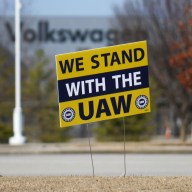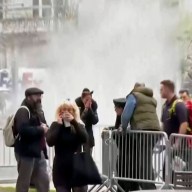EDMONTON – To look at the fatigue etched in Maj. Rodger Lerminiaux’s face you would never guess the Griffon helicopter pilot is part of a unit that just made military history.
A few days ago Lerminiaux returned home from Afghanistan where the Canadian Helicopter Force completed its first deployment of choppers in a combat zone.
In a few months the force of CH-47 Chinooks, escorted by CH-146 Griffons, transported more than 6,000 troops and thousands of tonnes of supplies, deftly flying over routes that could have been sown with the roadside bombs that have killed more than half of the Canadian soldiers who have died in Afghanistan.
“It absolutely saved lives,” said Lerminiaux, who added the aircraft were sometimes shot at by insurgents.
“Any time you can decrease the amount of people who are on those roads, when you can ferry them by air, you are cutting back the risk.”
The thump-thump-thump of rotor blades has also been a reassuring sound to troops on patrol, because it lets them know that Canadian crews in Canadian helicopters are watching over them.
Soldiers at forward operating bases and at the main base at Kandahar have made a point of telling the aircrew how pleased they are that Canada finally has its own helicopters after relying on NATO aircraft for years, he said.
“Any time you can provide air support to the troops on the ground … you are protecting them,” said Lerminiaux, who is deputy commander of 408 Squadron.
“There is no greater sense of pride than being able to stand and talk with the troops and listen to them articulate their sense of appreciation. Canadian helicopters, Canadian aircrew, supporting Canadian troops – it was fantastic.”
Acquiring battlefield helicopters was a key condition of last year’s Manley Commission report for keeping Canadian soldiers in Afghanistan until 2011.
Canada has had Griffon helicopters since the 1990s, but National Defence initially thought the aircraft were not suitable to the Afghan climate or for flying at high altitudes.
The Chinooks are second-hand, purchased from the Americans. Ottawa sold off Canada’s own force of Chinooks in 1993 to the Dutch to save money.
Lerminiaux said there is no doubt that Canadian troops would have benefited if such a helicopter force had been included when Canada began major troop deployments to Kandahar in 2006.
He is not alone.
Rick Hillier, the former chief of defence staff, said the decision in 1993 to sell off Canada’s Chinooks was a terrible move that ultimately made the mission in Afghanistan more difficult.
Hillier wouldn’t speculate on whether the helicopters could have saved any of the lives of Canadian soldiers who died between 2006 and 2008.
“Without doubt we would have been much more effective with them but nobody can say lives would have been saved,” Hillier said in an email.
“Most of the soldiers we have lost have been those who would have been on foot, in their vehicles or doing what they were doing anyway.
“But we could have had more effect, early on, and perhaps pre-empted some of the challenges now faced.”
The success of the helicopters could have implications for the future. The Air Force Association of Canada sent a position paper to the Defence Department last week that recommends it consider keeping the helicopters in Afghanistan after Canada’s NATO military mission ends in 2011. It says such a move would take some of the strain off hard-stretched army units.
“While the nature of the Canadian contribution to Afghanistan post-2011 is yet to be determined, it is likely that there will be continuing pressure to provide military capabilities to support reconstruction and rebuilding efforts,” says the paper.
The options include “extension of the employment of Chinook and Griffon helicopters in support of land operations.”
George Macdonald, a former vice-chief of defence staff, said the federal government will soon have to grapple with its plan for Afghanistan after 2011.
The helicopters “would provide a significant capability for whatever we do there,” Macdonald, who is honorary president of the association, said from Ottawa.
“I think this is something that the Canadian government might want to consider seriously. They have proven to be successful already.”
















